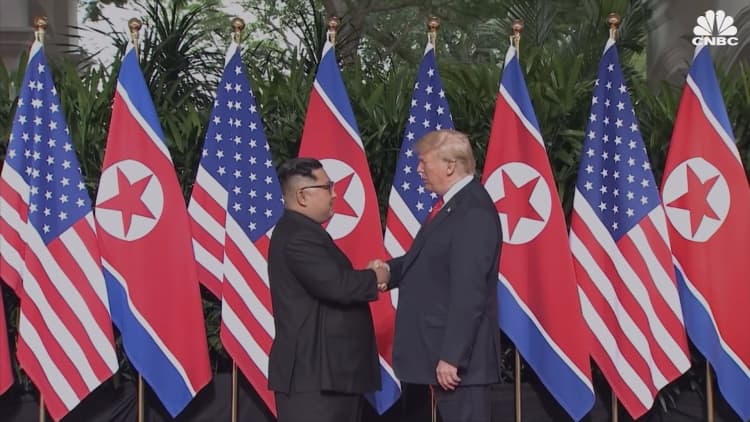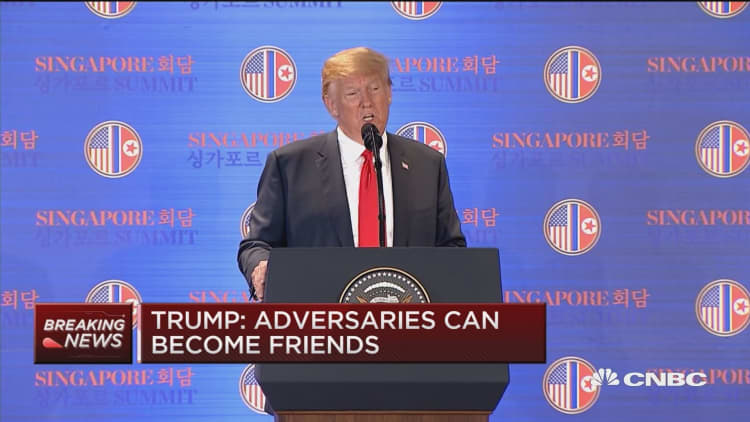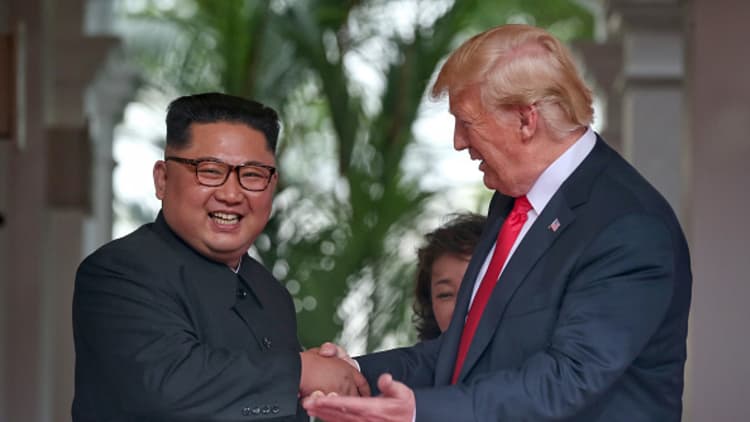
White House aides, ripping Canada's prime minister over trade disputes at the G-7 gathering, vowed not to let him paint President Donald Trump as weak before his nuclear summit.
In reality, Trump weakened his own hand at both the G-7 and his sit-down with North Korean dictator Kim Jong Un. His conduct was unprecedented because Trump's approach to the presidency — applying a narrow definition of America's self-interest according to his personal whims — is unprecedented.
And there was no sign of the muscular outcome Trump aides craved. "It has been," said longtime U.S. diplomat Nicholas Burns, "a bad week for American strength around the world."
At the G-7, Trump riled economic allies by pressing ahead for protective tariffs. He demands concessions from friendly democracies based on immediate economic benefit.
Before that gathering, he called for re-admission of Russian autocrat Vladimir Putin to the G-7 club. Afterward, he attacked the host prime minister as "weak"; offended by Justin Trudeau's refusal to acquiesce, he warned that will cost Canadians "a lot of money."

Trump invoked the same economic benefits in Singapore. He granted Kim's wish to suspend U.S. military exercises with South Korea, noting "we'll be saving a tremendous amount of money."
Candidate Trump touted negotiating skill as his foremost credential for the presidency. Approaching the summit, he reveled in talk he could win the Nobel Peace Prize.
His eagerness did not produce concrete results. The document he and Kim signed, calling for peace on a denuclearized Korean peninsula, contained neither a timetable nor details of any kind. It was less specific than earlier statements by Kim's predecessors.
Trump praises Kim
After meeting the brutal ruler, who has starved North Koreans and ordered the assassination of his own family members, Trump sidestepped asserting American values on freedom and human rights. He praised Kim as a "very talented" young man who took over his country and has "run it tough."
Summit stagecraft, featuring American flags arrayed side-by-side with North Korean flags, depicted the dictator as the president's peer. Trump told ABC's George Stephanopoulos that North Korea's impoverished people, who lack freedom to dissent, feel "a great fervor" for Kim.
Like Trump insisting Canada runs a trade surplus with the U.S. when data show the opposite, calling Kim a beloved leader sounds disconnected from reality. Yet he found a personal basis for their "very special bond" in Kim's praise for him.
"He said openly … that he knows no other president could have done this," Trump told Stephanopoulos. "I think he trusts me, and I trust him."
For foreign policy analysts, the good news was that the summit took place. Gritty negotiations toward denuclearization displace, at least for now, threats of armed conflict.
"Jaw-jaw is better than war-war," said ex-Obama aide Tony Blinken, quoting Winston Churchill. "Trump should be applauded for that."
Republican loyalists dismissed the idea that Trump surrendered concessions at all.
"In the words of John Lennon, 'Give peace a chance,'" said GOP Rep. Bradley Byrne of Alabama. "We gave up nothing, unless you think a suspension of joint exercises with South Korea is something — which as a member of the House Armed Services Committee, I don't."
South Korea's request for clarification signaled that Seoul views the joint exercises differently. And the fact that President Moon Jae-In got no advance word of the suspension shows what Trump, in both high-level meetings, plainly has given up.
Since the U.S. triumphed in World War II, its leaders have embraced a broad conception of national self-interest. It viewed strength at home — economically and otherwise — as intertwined with the strength of democratic friends abroad.
It accepted America's obligation, as the world's leading power, to sustain international alliances based in part on common values. When Trump was 14 years old, an earlier president facing a Cold War with the Soviet Union described the obligation memorably.
"We shall pay any price, bear any burden, meet any hardship, support any friend, oppose any foe in order to assure the survival and the success of liberty," John F. Kennedy declared.
Six decades later, Trump's "America First" doctrine little values those alliances or the strength the U.S. derives from them. He wants money back.
WATCH: Did Trump get played by Kim Jong Un?



